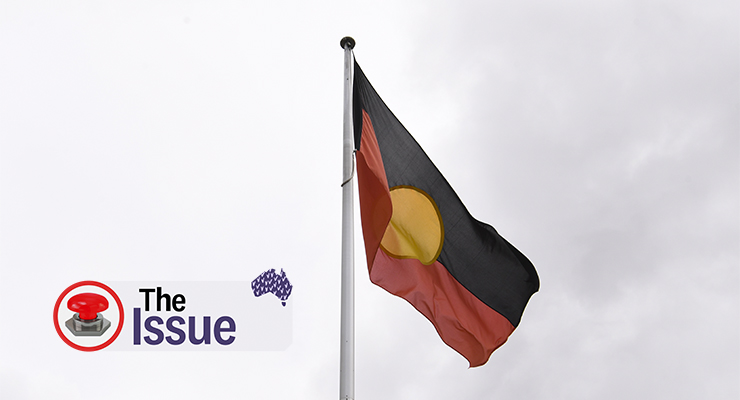
The Issue
With cost of living and a federal integrity commission dominating the leaders debate and election campaign, issues facing First Nations peoples have largely been left out of the discourse.
The Greens are leading the way with policies to improve First Nations peoples’ quality of life, followed by Labor then Liberal — though Labor leader Anthony Albanese has largely avoided spruiking these policies in press conferences.
While Labor’s website has a page dedicated to its First Nations policies, ranging from land conservation to adding a voice to Parliament, the Liberal Party has no new policies — and avoids mentioning Aboriginal and Torres Strait Islander peoples in pages dedicated to healthcare, education and regional Australia.
Here’s what is — and isn’t — being discussed.
Voice to Parliament
An increasing number of Australians support a referendum to create an Indigenous Voice to Parliament — with 73% of Australians saying in a Vote Compass poll they agree there should be constitutional change to give Indigenous peoples a greater say over their lives, up from 64% in 2019.
Adding an Indigenous voice to Parliament is part of the 2017 Uluru Statement from the Heart calling for an amendment to the constitution to establish a representative Indigenous body to advise Parliament on laws and policies affecting Indigenous peoples.
In 2019, the Coalition promised to hold a referendum on Indigenous recognition, pledging $160 million in the process. This never happened — with Prime Minister Scott Morrison saying earlier this month the Coalition had no plans to hold one. As he said last Monday:
It’s not our policy to have a referendum on the Voice, so why would I be doing that?
Albanese has committed to enshrining a Voice to Parliament but didn’t give a timeframe. Indigenous leaders have called for the referendum to be held on May 27, 2023, or January 27, 2024.
Labor is the only party to support the Uluru Statement in full. The Greens support introducing the statement in a different order, prioritising implementing a truth-telling treaty before adding a voice to Parliament — causing a number of Greens members to walk away from the party.
Incarceration
About 500 Aboriginal and Torres Strait Islander peoples have died in police custody in the 31 years since the landmark royal commission report into the issue.
First Nations peoples make up just 3.3% of Australia’s population yet 33% of the national prison population. Children, too, are overrepresented in the prison population — Australia’s criminal age of responsibility is 10, well below the United Nations’ recommended age of 14.
Labor has promised to invest in justice reinvestment initiatives in 30 communities, with $13.5 million in funding for Aboriginal and Torres Strait Islander legal services to represent families in coronial inquests. The federal government has no consolidated data on how many Aboriginal and Torres Strait Islander peoples have died in custody, and Labor has vowed to establish real-time reporting of death.
The Coalition has provided an additional $3.2 million to support those in prison, helping Aboriginal and Torres Strait Islander peoples to prepare for employment upon release.
Both parties support targets as part of the Close the Gap initiative as devised by the national cabinet. Last August $1 billion in funding was provided to reach these goals.
Violence against women and their children
The Coalition has pledged to increase funding for Aboriginal and Torres Strait Islander family support services for families who are experiencing, witnessing or at risk of family or domestic violence, as part of its $2.5 billion in women’s safety initiatives included in the latest budget.
Labor has no specific policies for First Nations women fleeing violence, though supports a range of broad measures to end family, domestic and sexual violence.
Indigenous healthcare
First Nations peoples die from avoidable causes at three times the rate of non-Indigenous people and have shorter life expectancies.
Labor has pledged to invest in upgrades in Aboriginal community-controlled health services with $45 million to address kidney disease, $52.9 million for a First Nations health worker traineeship program, and $13.5 million to help eradicate rheumatic heart disease.
The Coalition has not announced any new policies but in August provided an additional $254.4 million to support Aboriginal community-controlled health organisations.
What’s the takeaway?
First Nations peoples have largely been left out of the 2022 election campaign by Labor, the Liberals and independents. While there have been specific policies announced by Labor, there’s nothing new or very significant, with some criticising the lack of detail in the policies, such as giving a date for enshrining a First Nations Voice to Parliament.








Crikey is committed to hosting lively discussions. Help us keep the conversation useful, interesting and welcoming. We aim to publish comments quickly in the interest of promoting robust conversation, but we’re a small team and we deploy filters to protect against legal risk. Occasionally your comment may be held up while we review, but we’re working as fast as we can to keep the conversation rolling.
The Crikey comment section is members-only content. Please subscribe to leave a comment.
The Crikey comment section is members-only content. Please login to leave a comment.